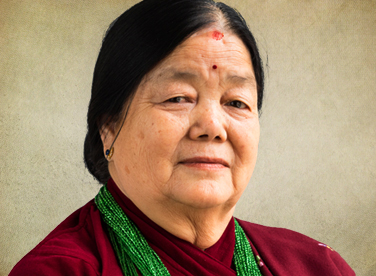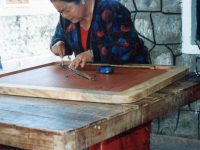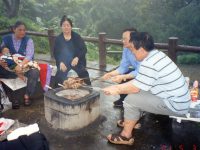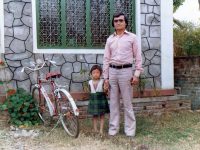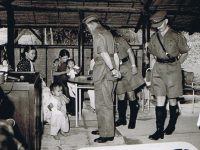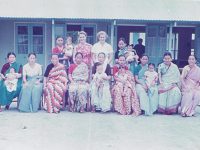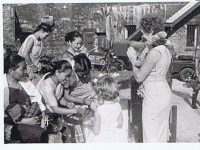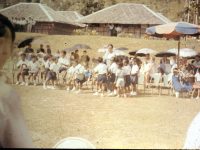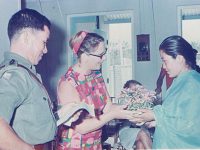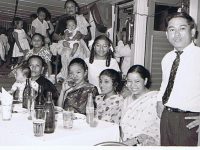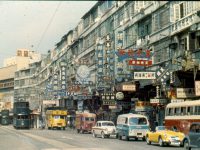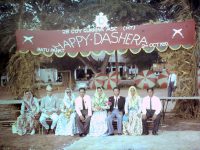Tham Maya Pun
Tham Maya Pun Gurkha wife
(Portrait © Gurkha Voices Oral History Project)
Once a Gurkha soldier had served in the army for three years he was given his ‘Nepali leave’ of six months to return home for the first time since he joined up. It was his chance to show his village and family what he’d achieved. During this time, a soldier usually chose his wife through an arranged marriage. If they were lucky they could return together to his army base in Brunei, Hong Kong etc, but usually his wife would stay in Nepal for the next three years until he returned again. After his second Nepali leave a Gurkha usually had permission to return with his wife and live in the married quarters on base. This is the context for how the veterans for Gurkha Stories chose their wives between 1953 to 1986.
During our recording sessions with the veterans it was very clear how a Gurkha’s wife is the strong backbone to their family and home life. She is relied upon to run the home, the children’s lives for years and years separated from her husband. In fact, it wasn’t unusual to only live together for 3-5 years out of your husband’s 15 year career in the army. So we wanted to include some of the wives’ stories and their amazing perspectives of being a Gurkha’s wife.
-
Business: carrom board games
-
Family BBQ, Hong Kong
-
Durga & daughter
Tham is married to Durga Bahadur Pun and they are both retired and live at Abbeygate House, Colchester since 2013. They grew up together in the village of Doba, Nepal and were married when Durga came on home one Nepali leave.
Tham has lived in Hong Kong (fluent in Cantonese), Brunei and Singapore as the wife of a Gurkha, with extended periods at home in Nepal while Durga was posted overseas. After her husband’s retirement she has helped with various businesses he was involved in, making carrom boards for example. Her son and daughter live in Hong Kong with their families.
Tham is determined to master the English language and attends daily classes near Abbeygate House at Fresh Beginnings in Colchester.
Gurkha Stories has been given permission to use a selection of photos by Jonathan Godwin whose father, Bill, was a Major in the British Army in the 1950/60s with the 31 Squadron, Gurkha Transport Regiment in Sarawak, Hong Kong and Singapore. He took photos of the Gurkha wives and family events in this period. Although these are not all Tham’s photos they depict the environment she would have lived in when she stayed with her husband in Hong Kong and Brunei in the 1960s. Thanks to the Godwin family for the use of these evocative photos of this era.
(More Gurkha stories are in our book, published later this year. Keep posted via our blog: www.gurkhastories.wordpress.com)
-
Welfare centre, Nee Soon Garrison, Singapore
-
Wives & children of the GTR, Singapore
-
Wives & children of the GTR, Singapore
Interview Extract (based on interpreter's translation):
I was born in Singapore and when I was small I moved back to Nepal because my father, he was sick, and we took him to a place called Veera and that’s where he passed away. He was a sergeant in the British Gurkhas. For me myself, I don’t remember my dad that much so it doesn’t affect me as much, but I keep on looking at the pictures nowadays.
My mum was 16 when she had me and there wasn’t much age gap, so we got along well together, more like sisters. And she had my sister when she was about 19. She used to talk a lot about our dad, but now I just look at the pictures. If I remember of old days, it just brings tears to my eyes, but it’s okay.
When I got married, my husband went back to Hong Kong for about three years and then he came back to take me to Hong Kong, and we had two children there. And then after that we all came back to Nepal, and I had another child, so we had three children. But when two of the children were small they passed away back in the village. But nowadays, I’ve got two grandchildren, one granddaughter, one grandson.
[Growing up] in the village, if a girl got married to an army soldier, they say, “Oh, she got married to army,” and everyone gets happy [laughter].
Back then I didn’t know about any financial stuff and really just got married, but when my husband came back we had some struggles with our pension, so it was really hard for us to live. But in 1999 we moved to Hong Kong ’til 2012, and we both worked in Hong Kong. And I went to Nepal for six months before we came here [UK]. But I know how to speak Chinese properly [laughter] because I worked in Hong Kong quite a bit.
[In Hong Kong] I worked as a cleaner in the same company for 12 to 13 years. I used to clean the street as in the market streets where they used to sell vegetables, poultry and all that.
The Nepalese who used to come to Hong Kong, they always used to look for me to look for a job for them, and I used to be like a translator to the employer. And the employer used to say, “Get me bank details, everything,” and I used to tell them. So I gave a lot of Nepalese a few jobs in Hong Kong. Everyone used to know me there and Nepalese, Chinese, everyone. So when I went back to Hong Kong for holiday the last time, they used to tell me to wait there and just stay there and everything, and it feels like a village in Nepal to me [laughter].
The difference between Nepal and Hong Kong is in Nepal you have to work to have food and you don’t earn any money. But in Hong Kong you work to get money so you can buy food, so that was the difference.
There’s a lot of difference between my children and our lives. My children, they are settled in Hong Kong with two kids right now, so they work for themselves and they earn for themselves. And my daughter, she has got a son of 15 or 16 years old, and my son, he just had a baby girl. So they are working. And we’re just settled ourselves as well, so we’re all okay right now. But in the future we don’t know what will happen. And now for us, I’m 61 years old and my husband is 67, so we can’t work.
I used to think it would be really cold [in the UK]. And my husband, he kept on insisting me to come here. He used to say, “Oh, we’ve got rights to go there, so let’s go,” But I just wanted to stay there in Hong Kong. But now I want to stay in the UK and my husband tells me, “Let’s go to Nepal!,” but I don’t really want to go [laughter]. But here, I really like it because it’s really warm here. And when I went back to Nepal it reminded me of here. I used to think about the warmness and the heater and everything. So I really like it here now.
-
School life of the GTR children, Singapore
-
Presentation time
-
Party time!
-
Hong Kong, c.1960
-
Hong Kong, c.1960
-
Hindu festivals celebrated during army life
Oral histories: © Gurkha Voices Oral History Project

